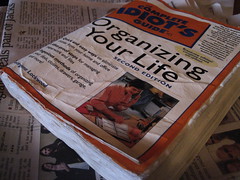Memory Gordon AP Flashcards
Terms : Hide Images [1]
| 5822924584 | flashbulb memory | unusually clear memory of an emotionally significant moment or event.....think 9/11 or Sandy Hook shooting. Amygdala is instrumental in formation of these memories (think fear, anger, etc.) |  | 0 |
| 5822950600 | rosy retrospection | the tendency to remember and recollect events more favorably than when they occurred. It is related to the popular idiom "to see through rose-colored glasses." |  | 1 |
| 5822993839 | Eidetic memory | an ability to vividly recall images from memory after only a few instances of exposure, with high precision for a brief time after exposure. Basically photographic memory | 2 | |
| 5823213548 | levels of processing model of memory | we tend to remember things better when we process them more deeply and elaborately, rather than simply just hearing it and repeating it (shallow processing) |  | 3 |
| 5823229757 | Three box/information processing model of memory | proposes that our memory is like a computer. We form memories (encoding), hold them (storage), and bring them back up (retrieval). | 4 | |
| 5822924585 | encoding | processing of getting information into the memory system..... writing code |  | 5 |
| 5822924586 | storage | retention of encoded information over time |  | 6 |
| 5822924587 | retrieval | process of getting information out of memory storage |  | 7 |
| 5822924588 | sensory memory | the immediate, very brief recording of sensory information in the memory system (visual, auditory, olfactory, etc.) |  | 8 |
| 5822924589 | short-term memory | activated memory that holds items briefly (20-30 seconds). Average person can retain about 7 items |  | 9 |
| 5822924590 | long-term memory | relatively permanant and limitedless storehouse of the memory system |  | 10 |
| 5822924591 | working memory | newer understanding of short-term memory that involves conscious, active processing of incoming auditory and visual-spatial information |  | 11 |
| 5822924594 | rehearsal | conscious repetition of information, either to maintain it in consciousness or to encode it for storage |  | 12 |
| 5822924595 | spacing effect | tendency for distributed study or practice to yield better long-term retention than is achieved through massed study or practice |  | 13 |
| 5822924596 | serial position effect | our tendency to recall best the last and first items in a list and neglect some items in the middle |  | 14 |
| 5823342861 | self-reference effect | the tendency for people to remember things better when they feel the information relates to them.....for example if you have been to Japan, you are more likely to pay attention and remember the information about Japan in geography class or understand Japanese art better | 15 | |
| 5822924597 | visual encoding | encoding of picture images |  | 16 |
| 5822924598 | acoustic encoding | encoding of sound, especially the sound of words |  | 17 |
| 5822924599 | semantic encoding | encoding of meaning, including the meaning of words |  | 18 |
| 5822924601 | mnemonics | memory aids; like vivid imagery or acronyms (ROYGBIV) |  | 19 |
| 5822924602 | chunking | organizing items into familiar, manageable units; often occurs automatically |  | 20 |
| 5822924603 | iconic memory | momentary sensory memory of visual stimuli |  | 21 |
| 5822924604 | echoic memory | momentary sensory memory of auditory stimuli; sounds can be recalled within 3 or 4 seconds |  | 22 |
| 5822924605 | long-term potentiation (LTP) | Technical name for how a memory is stored. The synaptic connections are strengthened with production of a chemical called CREB which strengthens neural connections. Process described by Erik Kandel as he studies sea slugs |  | 23 |
| 5822924606 | amnesia | loss of memory |  | 24 |
| 5823532012 | anterograde amnesia | loss of the ability to create new memories after the event that caused damage to the brain. Usually caused by damage to hippocampus.....think "ten second Tom character" and Clive Wearing. |  | 25 |
| 5822924607 | implicit memory | a memory that does not require conscious thought to carry out/perform. Usually a muscle memory....might see it as procedural memory |  | 26 |
| 5824278739 | cerebellum | part of the brain useful in processing and carrying out procedural, muscle type memories |  | 27 |
| 5822924608 | explicit memory | memory of facts and experiences that one can consciously know and "declare". Episodic and semantic memories fall under this category |  | 28 |
| 5822924609 | hippocampus | neural center that is located in limbic system and helps process explicit memories for storage |  | 29 |
| 5822924610 | recall | measure of memory in which the person must retrieve information learned earlier with out any clues in front of them |  | 30 |
| 5822924611 | recognition | measure of memory in which the person need only identify items previously learned.....think multiple choice test |  | 31 |
| 5822924612 | relearning | memory measure that assesses the amount of time saved when learning material for a second time. If you have learned a song years ago it's easier and quicker to learn again |  | 32 |
| 5822924614 | deja vu | that eerie sense that "I've experienced this before" |  | 33 |
| 5822924615 | mood-congruent memory | tendency to recall experiences that are consistent with one's current good or bad mood. If you're in a sad mood, you tend to recall sad memories....tough part of depression. |  | 34 |
| 5822924616 | proactive interference | disruptive effect of prior learning on the recall of new information. Old info blocks new info | 35 | |
| 5822924617 | retroactive interference | disruptive effect of new learning on the recall of old information. New information blocks old. Can remember new address but can't recall old address |  | 36 |
| 5822924618 | repression | in psychoanalytic theory, the basic defense mechanism that banishes from consciousness anxiety-arousing thoughts, feelings, and memories |  | 37 |
| 5822924620 | source amnesia | attributing to the wrong source an event we have experienced, heard about, read about, or imagined |  | 38 |
| 5822924622 | Maintenance Rehearsal | The process of repeatedly verbalizing or thinking about a piece of information. |  | 39 |
| 5822924624 | Primacy Effect | This is the tendency for the first items presented in a series to be remembered better or more easily, or for them to be more influential than those presented later in the series. |  | 40 |
| 5822924625 | Declarative Memory | It refers to memories which can be consciously recalled such as facts and events. |  | 41 |
| 5822924627 | Episodic Memory | A category of long-term memory that involves the recollection of specific events, situations and experiences someone has gone through. | 42 | |
| 5822924628 | State Dependent Memory | Learning that takes place in one situation or "state" is generally better remembered later in a similar situation or state. People that drink are more likely to remember something they did while drinking when they drink the next time |  | 43 |
| 5822924629 | Decay | forgetting something as the memory fades with time | 44 | |
| 5822924630 | Richard Atkinson | Atkinson's most fundamental and far-reaching contribution to cognitive psychology is the Atkinson-Shiffrin model (with Richard M. Shiffrin), one of the most significant advances in the study of human memory. It put a theory of memory on a mathematical basis for the first time. | 45 | |
| 5822924631 | Herman Ebbinghaus | He was a German psychologist who pioneered the experimental study of memory, and is known for his discovery of the forgetting curve and the spacing effect. He was also the first person to describe the learning curve. | 46 | |
| 5822924633 | Elizabeth Loftus | She is an American psychologist and expert on human memory. She has conducted extensive research on the misinformation effect and the nature of false memories. | 47 | |
| 5824828907 | Lost in the Mall study | conducted by Elizabeth Loftus.....she convinced 25 % of subjects that they had been Lost in a mall when they were younger when in fact they had not. Shows that false memories can be implanted. | 48 | |
| 5822924636 | memory | the mental capacity or faculty of retaining and reviving facts, events, impressions, etc., or of recalling or recognizing previous experiences. |  | 49 |
| 5846922381 | TOT phenomenon | the feeling the the information is still stored, but can't quite be retrieved. "Tip of the tongue" | 50 |
